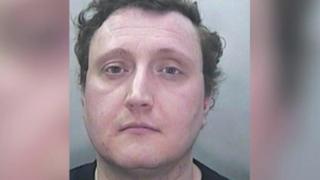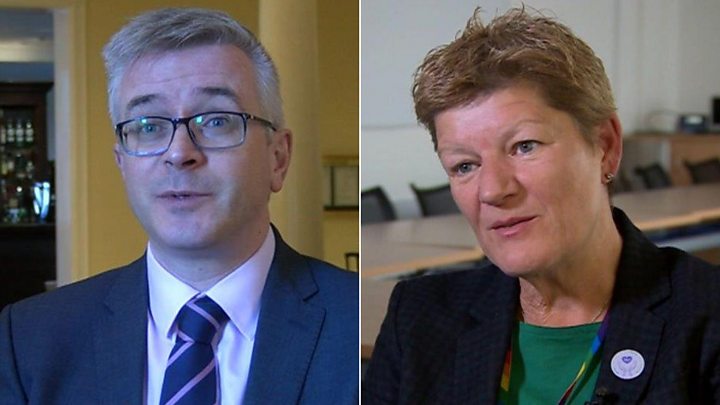
Image copyright
South Wales Police
Three sex assault allegations were found proven by a health board disciplinary panel – three weeks after Wade murdered his neighbour
Background checks have not been done on scores of staff at a health board, according to a watchdog.
It also criticised Abertawe Bro Morgannwg's handling of sex assault claims from patients with learning difficulties against a care worker.
Kris Wade later admitted the brutal murder of a neighbour in Cardiff Bay in 2016, while suspended from his job.
Health Inspectorate Wales (HIW) found he was not checked – like 142 others working in his old department.
Health Minister Vaughan Gething has now called for urgent advice from health boards as to how the rules on checks could be tightened across Wales.
"Once an approach is agreed, these measures will be implemented as quickly as possible," he said.
Wade did not get a criminal record check (CRB) when he was re-deployed to work as a care assistant at the end of 2004, or when disclosure and barring service (DBS) checks were introduced in 2012.
However, police later indicated that no concerns would have been found if Wade had been checked when he started working with vulnerable patients.
There were also no concerns about his performance or interaction with patients before the first of three allegations was made.
- 'Senseless, brutal' murder of neighbour
- Ex-patient sues health board over sex assault claim
- Health board review 'wholly insufficient'
- DBS system 'too mechanical'
The HIW found that 142 of the 2,000 staff working in Abertawe Bro Morgannwg's (ABMU) learning disabilities directorate did not have DBS checks or renewed checks.
ABMU said DBS checks were now underway with 90% of staff in that department – with half completed – and all would be done within three months.
It said it had also taken a decision to check all existing staff working with all vulnerable or at-risk patients.
The independent review, ordered by the Welsh Government in 2017, also found:
- An "unacceptable delay" in reporting the first allegation of sex assault and inappropriate touching by a female patient at a unit in Ely, Cardiff, which ABMU – mainly responsible for hospitals and centres from Swansea to Bridgend – ran for Cardiff and Vale health board.
- When Wade was redeployed from his IT job with ABMU to become a care assistant – he had previous experience in the private sector – he started work before a vacancy form was completed in line with procedures.
- Wade was put on "special leave" first of all when the initial allegation was made but should have been suspended earlier.
- The eventual disciplinary process took too long – with the investigator overseeing it alongside her normal job. Meanwhile, staff were not interviewed, which would have given more context.
- Although Wade's father was a former clinical director of the learning disabilities directorate, the HIW was satisfied this had no direct influence on the disciplinary process. It did however say there was a potential for conflict of interest and that dealing with the claims should have been led by someone from outside the directorate from the start.
- Although it found the health board's own review conclusions "not unreasonable" it found that the conclusion that Wade's actions outside work could not have been predicted or prevented was not based on evidence – and the review could neither support it or refute it.
THE TIMELINE OF THE KRIS WADE CASE
March 2001: Kris Wade was first employed by the former Bro Morgannwg NHS Trust (later becoming ABMU) as trainee developer in IT department at Neath hospital.
December 2004: He became sick – sleep problems put down to computer screen work – and was redeployed in the learning disabilities directorate as a nursing/care assistant.
Wade was redeployed to work at a unit in Ely, Cardiff – run by the west Wales health board
December 2011: Allegations of sexual assault raised by a female patient at an ABMU-run centre where Wade worked in Ely, Cardiff. An incident form was not created and the claim was not escalated. There was a delay of three weeks before he was placed on "special leave".
February 2012: No further action due to insufficient evidence after a police investigation, which involved speaking to six members of staff and the alleged victim.
April: Returned to work in a different, residential learning disability unit with only three patients.
October: A second female makes further sex assault allegations about incident in 2010 via a text message to a nurse. Wade was again placed on special leave while police investigated but the CPS decided not to prosecute.
February 2013: An internal investigation decided a full investigation would not uncover any more evidence. But a third allegation of historic abuse – dating back to the spring of 2011 – was now made and police investigated all three cases. Wade was formally suspended.
June: File submitted to CPS by police
January 2014: CPS decided there was not enough evidence to prosecute but police expressed "considerable concerns" about Wade returning to the unit and agreed to provide evidence to the health board.
February: Wade to remain suspended while health board conducted internal inquiry – led by a senior manager from outside the directorate – based on a lower burden of proof than a criminal investigation.
March 2015: More than a year later, a final investigation report is available with a disciplinary hearing scheduled for July.
December 2015: Disciplinary hearing – delayed because of Wade's ill health – is adjourned for more information but there were difficulties in arranging a convenient date.
Image copyright
Google | South Wales Police
Christine James lived alone in her fourth-floor flat in Century Wharf after moving from Cowbridge in November 2015
7 March 2016: Christine James, 65, found dead at her flat in Cardiff Bay. Neighbour Kris Wade was arrested for murder.
30 March: Disciplinary panel meets.
April: Dismissed for gross misconduct and letter sent to Wade in prison. A final meeting is held and finds all three sex assault allegations "proven".
September: Wade, 37, admitted murder and was jailed for life, to serve a minimum of 21 years after a "sexually motivated attack" in which his victim was subjected to "brutal and savage violence".
August 2017: An internal health board review found reporting procedures were not robustly followed when allegations had been made or that Wade's conduct and behaviour outside work could have been predicted or prevented.
September: One former patient to sue health board. Health Inspectorate Wales (HIW) is asked to conduct an investigation – to look at how the health board handled the case but not the police investigation.
Dr Kate Chamberlain, HIW chief executive, said it was "quite disappointing" that there were people working with vulnerable people who had not had basic checks and that this had to be part of a "robust" approach to safeguarding patients.
"It's only a basic check and it's important to realise that in this particular incident it would not have highlighted any matters of concern that would have indicated that the individual should not work with vulnerable adults," she said.
"However that's not an argument to say that they shouldn't be in place."
She said it was the health board's responsibility to ensure staff were fit and proper but it was "entirely appropriate" for the Welsh Government to look at how they can support them and set out what is expected of them.

Media playback is unsupported on your device
A VICTIM'S RESPONSE
"Kay" was the second of Wade's victims to report what happened, but only two years later in 2012 to a nurse by text. He had lifted her top and touched her and she froze. "You want to scream and shout but you can't move," she recalled to BBC Wales.
She believes Christine Wade would still be alive if the allegations had been treated seriously.
"He wouldn't have been out," she said.
After she found out about the other cases, she said she felt "sick, angry, disgusted".
"Because if they had taken the other people serious, it might not have happened to me. Because you've got a disability, I think they didn't take it as a serious as a normal person," she said.
Kay said she has been left scared of going to hospital – and it has affected relationships with her family.
"You shouldn't be scared of your dad, your uncles, your brother – or be scared to be treated if you're ill and scared of the doctors coming in the room."
Tracy Myhill, ABMU chief executive, said: "My heart goes out to our patients and the family of the victim who was murdered.
"The report recognises progress and future learning. For me it's added impetus and added focus on to the improvements we're trying to do anyway."
Dr Chamberlain said the main thing to learn was the importance of dealing with allegations in a timely fashion.
She said she was confident the health board was making progress but there was still "a lot of work to do" and it needed to be done "at pace".
Mr Gething said findings around quality and safety governance arrangements were "particularly disappointing".
But he said a new executive team was in place at ABMU and he was assured it was taking forward improvements and was committed to getting it right.
"The report makes 24 recommendations, three of which fall to Welsh Government to implement on an all-Wales basis," he added.
"I expect the health board to take full account of the findings and recommendations from this report, ensure that they are addressed and to embed changes to policies and procedures."
Leave a reply







Warning: count(): Parameter must be an array or an object that implements Countable in /home/httpdxfc/say-med.com/wp-includes/class-wp-comment-query.php on line 405